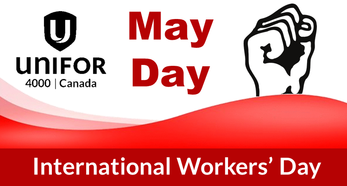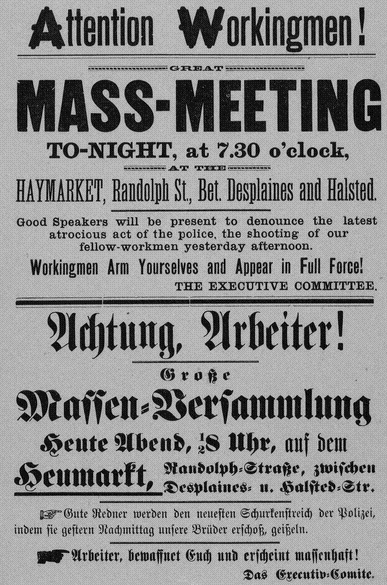May 1st is May Day - International Workers' Day
May 1, 2016
|
On May Day, in Canada and around the world, celebrities, artists, musicians, writers, faith organizations, charities and community activists will join workers and their unions in a call to honour those who have struggled to improve the lives of working people. The first day of every May is International Workers' Day.
In October 1884, a convention held by the Federation of Organized Trades and Labour Unions (FOTLU) of the United States and Canada unanimously set May 1, 1886, as the date by which the eight-hour work day would become standard. When May 1, 1886 approached, labour unions prepared for a general strike in support of the eight-hour day. |
On May 1, 1886, 80,000 people marched down Michigan Avenue in Chicago in the first-ever modern May Day Parade, in support of the eight hour day, in the midst of a general strike.
On May 3, 1886, striking workers in Chicago met near the McCormick Harvesting Machine Co. plant and a fight broke out when replacement workers attempted to cross the picket lines. Chicago police intervened and attacked the strikers, killing four and wounding several others, sparking outrage in the city's working community.
On May 3, 1886, striking workers in Chicago met near the McCormick Harvesting Machine Co. plant and a fight broke out when replacement workers attempted to cross the picket lines. Chicago police intervened and attacked the strikers, killing four and wounding several others, sparking outrage in the city's working community.
|
The next day, on May 4, 1886, workers gathered in Chicago's Haymarket Square to protest the deaths of the four strikers. It was a peaceful rally. Chicago mayor Carter Harrison showed up to watch but went home early. The speakers, which included August Spies and Samuel Fielden, both an anarchist labour activists, decried the earlier violence and urged calm. But as Fielden finished his speech, the police advanced on the rally, armed and in formation. Someone threw a bomb at the police line, killing one police officer. Mayhem ensued and 60 police officers were wounded along with an unknown number of civilians. Seven policemen and at least four workers were killed.
To this day, no one knows who threw the bomb. Many suspect it was a Pinkerton’s agent acting as an agent provocateur, while others suspected it was a disgruntled worker. But no one, not even the prosecutors at the trials that followed, could make any connection between the death of Constable Matthias Degan and the 8 men charged with his murder at Haymarket, all of whom were prominent union leaders. In what's considered one of the greatest miscarriages of justice in American history, a jury found all eight guilty and sentenced seven of them to death. Two men had their sentences commuted to life in prison. One committed suicide in jail. On November 11, 1887, four men, August Spies, Albert Parsons, Adolph Fischer and George Engel were hanged. In contrast, more conservative unions in the United States, who had rejected the call for the eight hour day, were busy organizing their own holiday, which later became "Labour Day." US President Grover Cleveland recognized Labour Day in 1887, to avoid giving support to the more progressive May Day movement. Earliest records show that the Toronto Trades Assembly (TTA), perhaps the original central labour body in Canada, as organizing the first North American 'workingman's demonstration' of any significance on April 15, 1872, but Labour Day in Canada was not legally recognized until July 23, 1894, when the government of Sir John Thompson enacted legislation with the Prime Minister piloting the bill through Parliament against the opposition of some of his Conservative followers. |
Inspired by the American movement for a shorter workday, socialists and unionists around the world began celebrating May 1st, or “May Day,” as an international workers' holiday. In the twentieth century, the Soviet Union and other Communist countries officially adopted it. This later prompted the US government to designate the first of May as "Loyalty Day".
The Haymarket tragedy is remembered throughout the world in speeches, murals, and monuments.
Corporate globalization is driving down wages worldwide. Companies are shuttering profitable operations to find more profits elsewhere. With this in mind, we must not forget how May Day started: 80,000 working people from all professions, trades and walks of life, coming together to seek the betterment of all on a street in Chicago, Illinois.
We may need to re-learn the struggles and victories of these workers way back then as today; we appear to be going backwards, where workers’ wages and benefits are shrinking while our working hours are increasing.
Click on the links below for more detailed information on May Day and the Haymarket affair (Wikipedia):
Related:
September 4, 2015 - Labour Day - The Holiday Canada gave the World
The Haymarket tragedy is remembered throughout the world in speeches, murals, and monuments.
Corporate globalization is driving down wages worldwide. Companies are shuttering profitable operations to find more profits elsewhere. With this in mind, we must not forget how May Day started: 80,000 working people from all professions, trades and walks of life, coming together to seek the betterment of all on a street in Chicago, Illinois.
We may need to re-learn the struggles and victories of these workers way back then as today; we appear to be going backwards, where workers’ wages and benefits are shrinking while our working hours are increasing.
Click on the links below for more detailed information on May Day and the Haymarket affair (Wikipedia):
Related:
September 4, 2015 - Labour Day - The Holiday Canada gave the World



